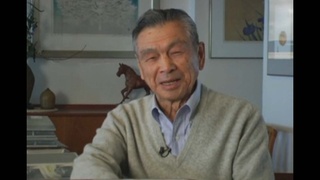Interviews
Positive experiences with Asian Americans for Action
It (Triple A1) was an experience for me. It made me much more aware of the faults of this system, in terms of [injustices to] non-whites. The first march I participated in with AAA, Asian Americans for Action, was devastating for me because to be yelled at when you’re walking in [protest demonstrations] the streets, “Go back to where you came from,” “Gooks!”—just hateful things. It was very hard for me to take.
The funny part of it was that newspapers were taking pictures of Asians. We [Asian Americans] were not known to be loudmouths or protesters so publicly. But here were these—primarily younger people, but a few of us various senior citizens—marching the streets. And wouldn’t you know a picture that appeared in the Village Voice of that big march, [and] right in the center was me. (laughter) I thought, “Wow, okay, the family is going to find out about this one.” (laughs) Sure enough they did. “What are you doing?”
But it was all right. I knew it was for a righteous cause in which we were involved. We got involved in this, including Lisa2, too. She became much more interested in things outside of our little family, outside of our community, which was really a good thing—a real good thing.
1. Founded by Kazu Iijima and Shiz “Minn” Matsuda, Asian Americans for Action, or Triple A, was one of the first East Coast pan-Asian organizations. Triple A stressed concerns for ethnic identity and pride, which underscored the philosophy of this organization. They sought to bring together various Asian American groups to motivate and mobilize them to political action.
2. Lisa Jo Abe Furutani is the narrator’s second daughter born in 1951.
Date: August 26, 1998
Location: Virginia, US
Interviewer: Darcie Iki, Mitchell Maki
Contributed by: Watase Media Arts Center, Japanese American National Museum











